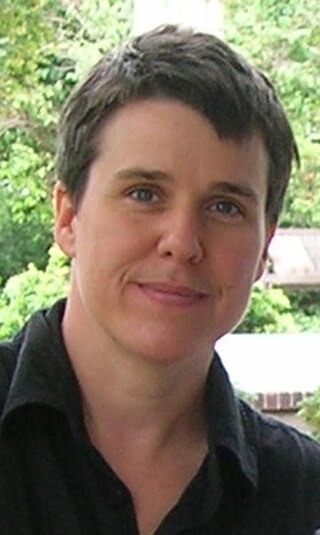Race to the bottom is a socio-economic phrase to describe either government deregulation of the business environment or reduction in corporate tax rates, in order to attract or retain usually foreign economic activity in their jurisdictions. While this phenomenon can happen between countries as a result of globalization and free trade, it also can occur within individual countries between their sub-jurisdictions. It may occur when competition increases between geographic areas over a particular sector of trade and production. The effect and intent of these actions is to lower labor rates, cost of business, or other factors over which governments can exert control.

Donna J. Haraway is an American Professor Emerita in the History of Consciousness Department and Feminist Studies Department at the University of California, Santa Cruz, and a prominent scholar in the field of science and technology studies. She has also contributed to the intersection of information technology and feminist theory, and is a leading scholar in contemporary ecofeminism. Her work criticizes anthropocentrism, emphasizes the self-organizing powers of nonhuman processes, and explores dissonant relations between those processes and cultural practices, rethinking sources of ethics.

Environmental policy is the commitment of an organization or government to the laws, regulations, and other policy mechanisms concerning environmental issues. These issues generally include air and water pollution, waste management, ecosystem management, maintenance of biodiversity, the management of natural resources, wildlife and endangered species. For example, concerning environmental policy, the implementation of an eco-energy-oriented policy at a global level to address the issues of global warming and climate changes could be addressed. Policies concerning energy or regulation of toxic substances including pesticides and many types of industrial waste are part of the topic of environmental policy. This policy can be deliberately taken to influence human activities and thereby prevent undesirable effects on the biophysical environment and natural resources, as well as to make sure that changes in the environment do not have unacceptable effects on humans.

Lynton Keith Caldwell was an American political scientist and a principal architect of the 1969 National Environmental Policy Act, the first act of its kind in the world. He was educated at the University of Chicago and spent most of his career at Indiana University Bloomington, where he received tenure in 1956 and retired as Arthur F. Bentley Professor Emeritus of Political Science in 1984. Caldwell was the internationally acclaimed author or coauthor of fifteen books and more than 250 scholarly articles, which may be found in at least 19 different languages. He served on many boards and advisory committees, as a consultant on environmental policy issues worldwide, and received numerous honors and awards.
Feminist political ecology is a feminist perspective on political ecology, drawing on theories from Marxism, post-structuralism, feminist geography, ecofeminism and cultural ecology. Feminist political ecology examines the place of intersectional social relations in the political ecological landscape, exploring them as a factor in ecological and political relations. Specific areas in which feminist political ecology is focused are development, landscape, resource use, agrarian reconstruction and rural-urban transformation. Feminist political ecologists suggest gender is a crucial variable – in relation to class, race and other relevant dimensions of political ecological life – in constituting access to, control over, and knowledge of natural resources.
David Leonard Downie is an American scholar focusing on international environmental politics and policy. He currently writes and teaches at Fairfield University.

The Centre for Development Studies (CDS), Thiruvananthapuram, Kerala, India is a premier Social Science research institute. It is also a higher education institution providing M.A. course in applied economics and PhD course in economics. It is a very reputed institution internationally also. Its main objective is to promote research, teaching and training in disciplines relevant to development.

The Institute of Development Studies (IDS) is a think tank affiliated with the University of Sussex in Brighton, England, and based on its campus in Falmer, East Sussex. It delivers research and teaching in the area of development studies, and was recognised as the number one international development think-tank in the 2019 Global Go To Think Tank Index Report.

Environmental social science is the broad, transdisciplinary study of interrelations between humans and the natural environment. Environmental social scientists work within and between the fields of anthropology, communication studies, economics, geography, history, political science, psychology, and sociology; and also in the interdisciplinary fields of environmental studies, human ecology and political ecology, social epidemiology, among others.

Ara Wilson is a university professor and author. Her work focuses on the feminist ethnography of globalization through description and analysis of various market economies. Her work examines the cultural, social, and sexual aspects of Bangkok economies, as well as illustrating the inaccuracies of Eurocentric ideology. Between 1988 and 2000, Wilson did fieldwork in Thailand and spent the years 1992-1994 doing research for The Intimate Economies of Bangkok: Tomboys, Tycoons, and Avon Ladies in the Global City. Wilson’s research is heavily focused on sexual and ethnic identity which “are produced and transformed through the modernity of the non-Western world”. Wilson is currently director of the program in the study of sexualities at Duke University, where she is also an Associate Professor of Women’s Studies. Wilson works extensively with non-governmental organizations dealing with women’s rights, as well as sexual rights in Thailand.
Gender and development is an interdisciplinary field of research and applied study that implements a feminist approach to understanding and addressing the disparate impact that economic development and globalization have on people based upon their location, gender, class background, and other socio-political identities. A strictly economic approach to development views a country's development in quantitative terms such as job creation, inflation control, and high employment – all of which aim to improve the ‘economic wellbeing’ of a country and the subsequent quality of life for its people. In terms of economic development, quality of life is defined as access to necessary rights and resources including but not limited to quality education, medical facilities, affordable housing, clean environments, and low crime rate. Gender and development considers many of these same factors; however, gender and development emphasizes efforts towards understanding how multifaceted these issues are in the entangled context of culture, government, and globalization. Accounting for this need, gender and development implements ethnographic research, research that studies a specific culture or group of people by physically immersing the researcher into the environment and daily routine of those being studied, in order to comprehensively understand how development policy and practices affect the everyday life of targeted groups or areas.

Martha Chen is an American academic, scholar and social worker, who is presently a lecturer in public policy at the Harvard Kennedy School and senior advisor of the global research-policy-action network WIEGO and a member of the Advisory Board of the United Nations University World Institute for Development Economics Research (UNU-WIDER). Martha is a development practitioner and scholar who has worked with the working poor in India, South Asia, and around the world. Her areas of specialization are employment, poverty alleviation, informal economy, and gender. She lived in Bangladesh working with BRAC, one of the world's largest non-governmental organizations, and in India, as field representative of Oxfam America for India and Bangladesh for 15 years.

Richard B. Norgaard is a professor emeritus of ecological economics in the Energy and Resources Group at the University of California, Berkeley, the first chair and a continuing member of the independent science board of CALFED, and a founding member and former president of the International Society for Ecological Economics. He received the Kenneth E. Boulding Memorial Award in 2006 for recognition of advancements in research combining social theory and the natural sciences. He is considered one of the founders of and a continuing leader in the field of ecological economics.

The contributions of women in climate change have received increasing attention in the early 21st century. Feedback from women and the issues faced by women have been described as "imperative" by the United Nations and "critical" by the Population Reference Bureau. A report by the World Health Organization concluded that incorporating gender-based analysis would "provide more effective climate change mitigation and adaptation."
Robert V. Bartlett is an American political scientist, currently the Gund Professor of the Liberal Arts at University of Vermont, previously the Fulbright Distinguished Chair at the Polytechnic University of Turin, the Frank Church Distinguished Professor at Boise State University, Senior Fulbright Scholar at Trinity College, University of Dublin, and a Senior Fulbright Scholar at the Centre For Resource Management at Lincoln University and University of Canterbury, He was educated at Indiana University Bloomington.
Susan Baker is a Professor Emerita in the School of Social Sciences and former co-director of the Sustainable Places Research Institute at Cardiff University. Her research concerns environmental governance in the European Union and ecofeminism, gender and the environment.
Kum-Kum Bhavnani is an American university professor, filmmaker, and author. As of 2018, she is a Professor of Sociology and Distinguished Professor with Feminist Studies and Global and International Studies at the University of California, Santa Barbara, where she is Chair of the interdisciplinary program in Women, Culture, Development. She served as the Chair (2019–20) of the University of California Academic Senate.
The history of climate change policy and politics refers to the continuing history of political actions, policies, trends, controversies and activist efforts as they pertain to the issue of global warming and other environmental anomalies. Dryzek, Norgaard, and Schlosberg suggest that critical reflection on the history of climate policy is necessary because it provides 'ways to think about one of the most difficult issues we human beings have brought upon ourselves in our short life on the planet’.

Climate change vulnerability is defined as the "propensity or predisposition to be adversely affected" by climate change. It can apply to humans but also to natural systems (ecosystems). Human and ecosystem vulnerability are interdependent. Climate change vulnerability encompasses "a variety of concepts and elements, including sensitivity or susceptibility to harm and lack of capacity to cope and adapt". Vulnerability is a component of climate risk. Vulnerability differs within communities and across societies, regions and countries, and can change over time. Approximately 3.3 to 3.6 billion people live in contexts that are highly vulnerable to climate change in 2021.









